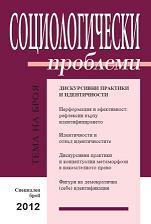Колективни идентичности и възможни светове
Collective Identities and Possible Worlds
Author(s): Darin TenevSubject(s): Social Sciences
Published by: Институт по философия и социология при БАН
Keywords: Saul Kripke; David Lewis; identity; collective identities; possible worlds;
Summary/Abstract: The presupposition of this paper is that, on the one hand, the semantics of possible worlds can help us articulate some of the most puzzling aspects of the notion of collective identities, and on the other, collective identities indicate to new perspectives on the whole problematic of the possible worlds. The following two questions are taken as a starting point: 1. In what sense can collective identities have a name? 2. In what sense are collective identities identities at all? The main point, made in the paper, is that in the case of collective identities (but may be all identities are collective?) names are used not to fix a reference, but rather to fix a relation to a particular set or subset of possible worlds. This means that every identity is based on oriented possibilities. The collective identity is al ways in a particular relationship with a set of possible worlds, or with a set of some of its possible states. The orientation is aprioristic (epistemological) but not necessary (ontological). Ontologically, identity is haunted by non-predetermined possibilities and therefore has as a ground the abyss of non-identity. The semantics of possible worlds, turned perhaps upside-down, can help us grasp this ontological problem. However, since it is the use of the names that fixes the relation to the particular set of possibilities, it is not semantics but pragmatics and theories like that of speech acts that are to be used in order to analyze concrete cases of the affirmation, reaffirmation, and negation of collective identities.
Journal: Социологически проблеми
- Issue Year: 44/2012
- Issue No: Special
- Page Range: 92-100
- Page Count: 9
- Language: Bulgarian
- Content File-PDF

